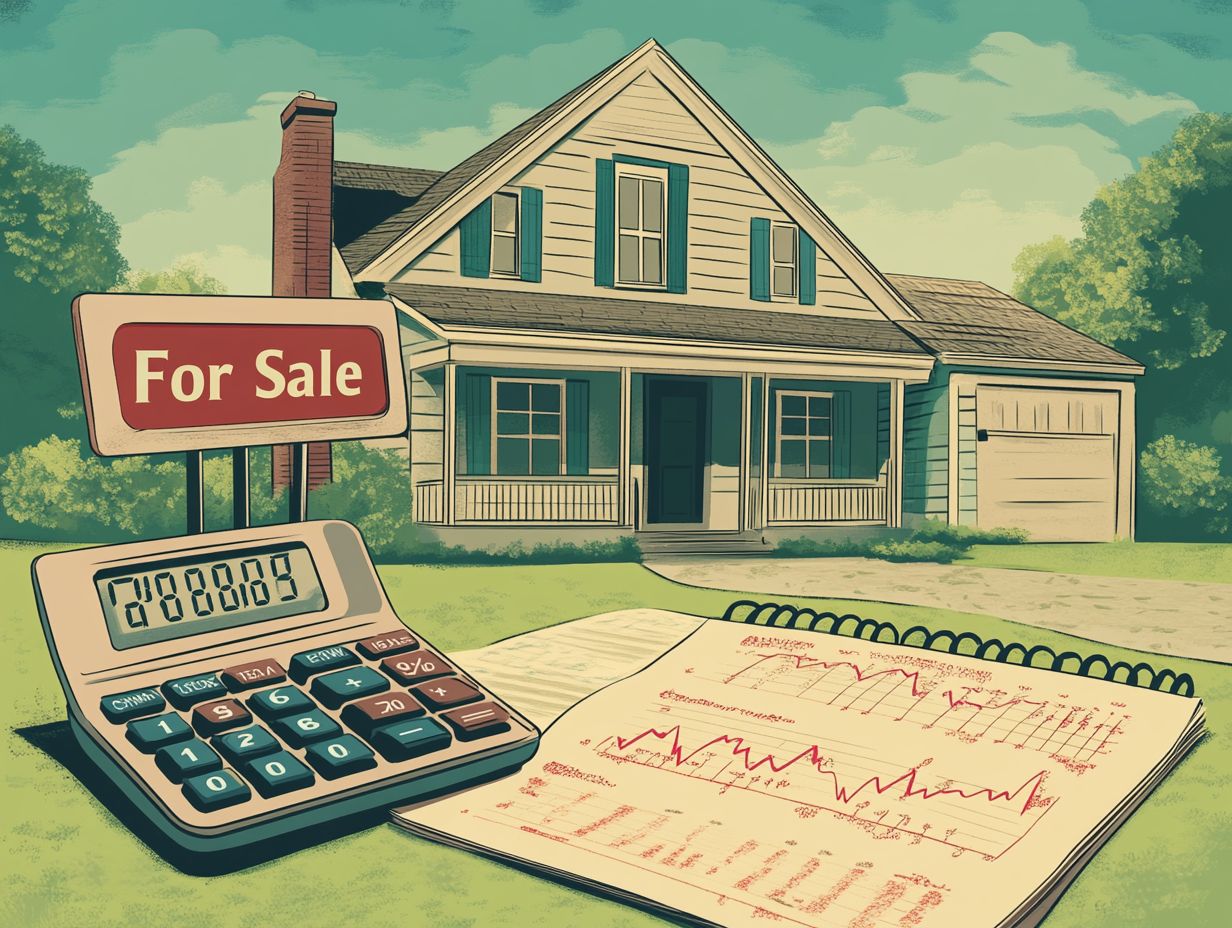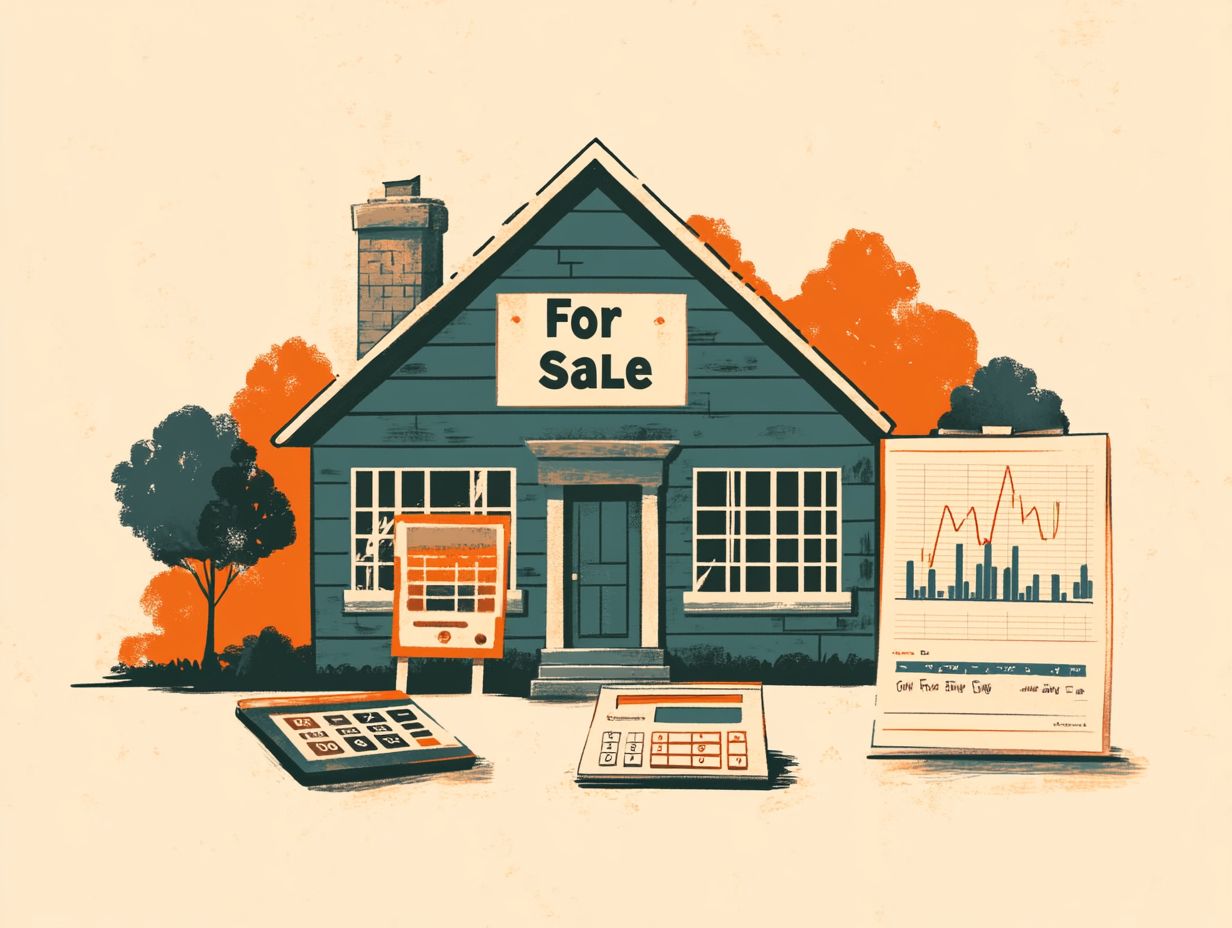How Interest Rates Influence Housing Markets
Interest rates significantly influence the housing market, impacting everything from home prices to the availability of mortgages. Understanding interest rates is not just a good idea it’s essential for making the best choices in today s fast-paced housing market!
By grasping how these rates fluctuate, you can gain valuable insights whether you re a buyer or a seller. This article delves into the intricate relationship between interest rates and housing markets.
We will examine the various factors that sway these rates and discuss their effects on affordability and home values. You ll find strategies for navigating this ever-changing landscape, along with predictions on future trends.
Whether you re looking to buy, sell, or simply keep your finger on the pulse, this guide will arm you with the knowledge you need to make informed decisions in real estate.
Contents
- Key Takeaways:
- Understanding Interest Rates and Housing Markets
- Factors that Impact Interest Rates
- Effects of Interest Rates on Housing Markets
- How to Respond to Changing Interest Rates
- Predicting Future Interest Rates and Housing Market Trends
- Frequently Asked Questions
- 1. How do changes in interest rates affect the housing market?
- 2. What is the relationship between interest rates and housing prices?
- 3. How do interest rates impact the affordability of homes for buyers?
- 4. How do rising interest rates affect the demand for homes?
- 5. How do lower interest rates impact the housing market for sellers?
- 6. What is the role of the Federal Reserve in influencing interest rates and the housing market?
Key Takeaways:

Interest rates have a significant impact on the housing market, affecting home prices, affordability, and understanding the impact of interest rates is crucial for potential buyers.
Economic conditions and government policies are key factors that influence interest rates, and therefore, the housing market. Stay informed and adapt your future home depends on it!
Understanding Interest Rates and Housing Markets
Grasping the connection between interest rates and the housing market is vital for you as a homebuyer, investor, or policymaker.
Interest rates, especially those established by the Federal Reserve, often called the Fed, play a pivotal role in determining mortgage rates. These rates shape homebuyer demand and influence real estate values.
In a landscape marked by fluctuating interest rates and rising inflation, an ongoing housing shortage can result in diverse home prices and monthly payments. Therefore, conducting a comprehensive analysis of these market factors is essential for making well-informed decisions regarding your home purchase.
What are Interest Rates and How do They Influence Housing Markets?
Interest rates are essentially the price tag on borrowing money. They play a crucial role in shaping housing markets especially through mortgage rates that directly impact your demand and purchasing power.
The fluctuations in these rates can significantly alter historical interest trends, influencing the decisions you and other homebuyers or investors make. When interest rates are low, it often feels like an invitation for potential homeowners to jump into the market.
Lower borrowing costs enhance affordability, creating a surge in demand. On the flip side, when those rates rise, you might find yourself reevaluating your home-buying plans.
Historical examples, like the aftermath of the 2008 financial crisis when rates dropped dramatically to stimulate the economy, show just how these shifts can drive market activity.
Savvy real estate investors recognize the paramount importance of managing interest rates effectively. They determine not only the cost of acquiring properties but also the overall viability of investments in a constantly shifting landscape.
Factors that Impact Interest Rates
Interest rates are shaped by a complex interaction of factors, including economic conditions, government policies, and capital flows. These define the financial landscape you navigate.
The decisions made by the Federal Reserve regarding federal funds significantly affect interest rates, along with inflation metrics like the Consumer Price Index.
Shifts in the 10-year Treasury bond yield also play a key role in determining mortgage rates, thereby influencing the dynamics of the housing market.
Economic Conditions and Government Policies

Economic conditions and government policies have a strong effect on interest rates. They shape the financial landscape in which you and banks operate.
Elements such as employment rates and inflation trends are crucial in determining the federal funds rate, which in turn affects the entire housing market.
When the economy is flourishing, marked by rising GDP and lower unemployment, you’re more likely to take out loans, which typically drives interest rates upward. On the flip side, during economic downturns, government measures to boost the economy, known as fiscal stimulus, can lower rates to encourage borrowing.
Shifts in housing policies, such as easing regulations on mortgage lending, can expand market access and affect homebuyer affordability. These interconnected dynamics not only influence your purchasing power but also lay the groundwork for broader economic stability or volatility.
Effects of Interest Rates on Housing Markets
The impact of interest rates on housing markets is significant, shaping aspects such as the role of mortgage rates in home buying, home prices, buyer demand, and overall market stability.
As interest rates rise, mortgage rates generally climb in tandem, resulting in diminished home affordability and influencing real estate values across different regions.
This intricate relationship plays a crucial role in the dynamics of the housing landscape, underscoring the importance of staying informed about market trends.
Home Prices and Affordability
Home prices are intricately linked to interest rates; as those rates rise, your purchasing power as a homebuyer tends to diminish, leading to a decrease in home affordability.
This interplay creates a ripple effect in the housing market, influencing demand and ultimately impacting real estate values.
For example, when interest rates increase by just 1%, you could see your purchasing power drop by approximately 10%. This change may force you to either lower your price range or postpone your home-buying plans altogether.
As a result, with fewer buyers entering the market, sellers may find themselves adjusting their asking prices, applying downward pressure on overall home values.
According to recent data from the National Association of Realtors, homes became less affordable in 2022, with monthly mortgage payments climbing 25% compared to the previous year. This trend underscores the delicate balance between interest rates and affordability, reshaping the decisions you ll make in the housing market.
Mortgage Rates and Loan Availability
Mortgage rates are a key factor affecting loan availability, which in turn shapes homebuyer demand and the overall housing inventory.
When interest rates climb, mortgage rates often follow suit, potentially tightening loan availability and influencing your decisions as a buyer. This shift can cool the housing market, as you may find yourself priced out or feeling hesitant to make significant financial commitments.
The dynamics of capital flows become essential during uncertain economic times; as investors seek safer assets, tighter lending practices can worsen existing housing shortages.
As a result, the interplay between interest rates, mortgage costs, and lending standards creates a cascading effect that influences buyer sentiment and transforms the available housing landscape.
Grasping these relationships is crucial for anyone like you navigating today s intricate real estate environment.
How to Respond to Changing Interest Rates

Effectively responding to changing interest rates demands strategic planning from both homebuyers and sellers, as these fluctuations can profoundly influence market conditions and financial outcomes.
By understanding the impact of interest rates, you can create strategies that enhance your ability to buy or sell a home. Stay proactive to make the most of your financial decisions!
Strategies for Homebuyers
Homebuyers have a wealth of strategies at their disposal to easily handle changing interest rates, especially concerning mortgage options and market analysis. By making well-informed home purchase decisions, take charge of your future in a challenging economic landscape.
Strategies for Sellers
For sellers, timing your listings is crucial to aligning with favorable market conditions. This ensures you make the most of your selling strategy.
Understanding the nuances between mortgage types, such as fixed-rate mortgages, which have a constant interest rate, and adjustable-rate mortgages, which can change over time, enables you to select the financing solution that best suits your needs.
Stay updated on shifts in interest rates, as they can profoundly influence your decision-making. This gives you the power to act strategically when the market presents its most opportune moments.
Predicting Future Interest Rates and Housing Market Trends
Predicting future interest rates and housing market trends is no simple feat; it demands insights from seasoned experts and thorough market analysis.
Given that economic forecasts significantly influence real estate values, cultivating a comprehensive understanding of market dynamics is essential for making informed investment decisions.
Expert Insights and Market Analysis
Expert insights and comprehensive market analysis are essential for grasping housing trends and the economic indicators that affect interest rates and real estate values. Organizations like Freddie Mac offer invaluable data that can enable you, as a homebuyer or investor, to make informed decisions.
By examining metrics such as housing starts, unemployment rates, and consumer confidence, you gain clarity on current market conditions and glean forecasts for future developments. Reputable organizations frequently collaborate with economists and industry specialists to produce detailed reports, making crucial information accessible to a broader audience.
This collaborative effort ensures you can navigate the intricate real estate landscape confidently, relying on robust data and expert opinions to enhance your investment strategies and improve your financial outcomes.
Frequently Asked Questions

1. How do changes in interest rates affect the housing market?
Changes in interest rates can significantly impact the housing market. When interest rates are low, it becomes more affordable for individuals to borrow money for mortgages, resulting in increased demand for homes. Conversely, when interest rates are high, it becomes more expensive to borrow money, decreasing the demand for homes.
2. What is the relationship between interest rates and housing prices?
There is an inverse relationship between interest rates and housing prices. As interest rates decrease, it becomes more affordable for individuals to borrow money for mortgages, leading to an increase in demand for homes, which drives up housing prices. Conversely, when interest rates increase, it becomes more expensive to borrow money, resulting in a decrease in demand for homes, and ultimately lower housing prices.
3. How do interest rates impact the affordability of homes for buyers?
Interest rates play a significant role in the affordability of homes for buyers. When interest rates are low, buyers can secure a mortgage with a lower interest rate, making their monthly mortgage payments more affordable. On the other hand, high-interest rates can make it more difficult for buyers to obtain a mortgage, resulting in higher monthly payments and reduced affordability.
4. How do rising interest rates affect the demand for homes?
Rising interest rates can significantly impact the demand for homes. As interest rates increase, the cost of borrowing money for a mortgage also increases, making it less affordable for potential buyers. This decrease in affordability can lead to a decline in demand for homes, as fewer individuals are able to secure financing for a home purchase.
Ready to find your dream home? Contact us today!
5. How do lower interest rates impact the housing market for sellers?
Lower interest rates benefit sellers. More people can secure financing for home purchases, leading to higher demand.
This increased demand drives up housing prices. It can also lead to quicker sales for sellers, which is great news!
6. What is the role of the Federal Reserve in influencing interest rates and the housing market?
The Federal Reserve plays a key role in setting interest rates. They determine the federal funds rate, the interest rate banks charge each other for loans.
This rate influences all other interest rates, including mortgage rates. When the Federal Reserve adjusts this rate, it affects how much it costs to borrow money for mortgages, impacting housing market activity.






